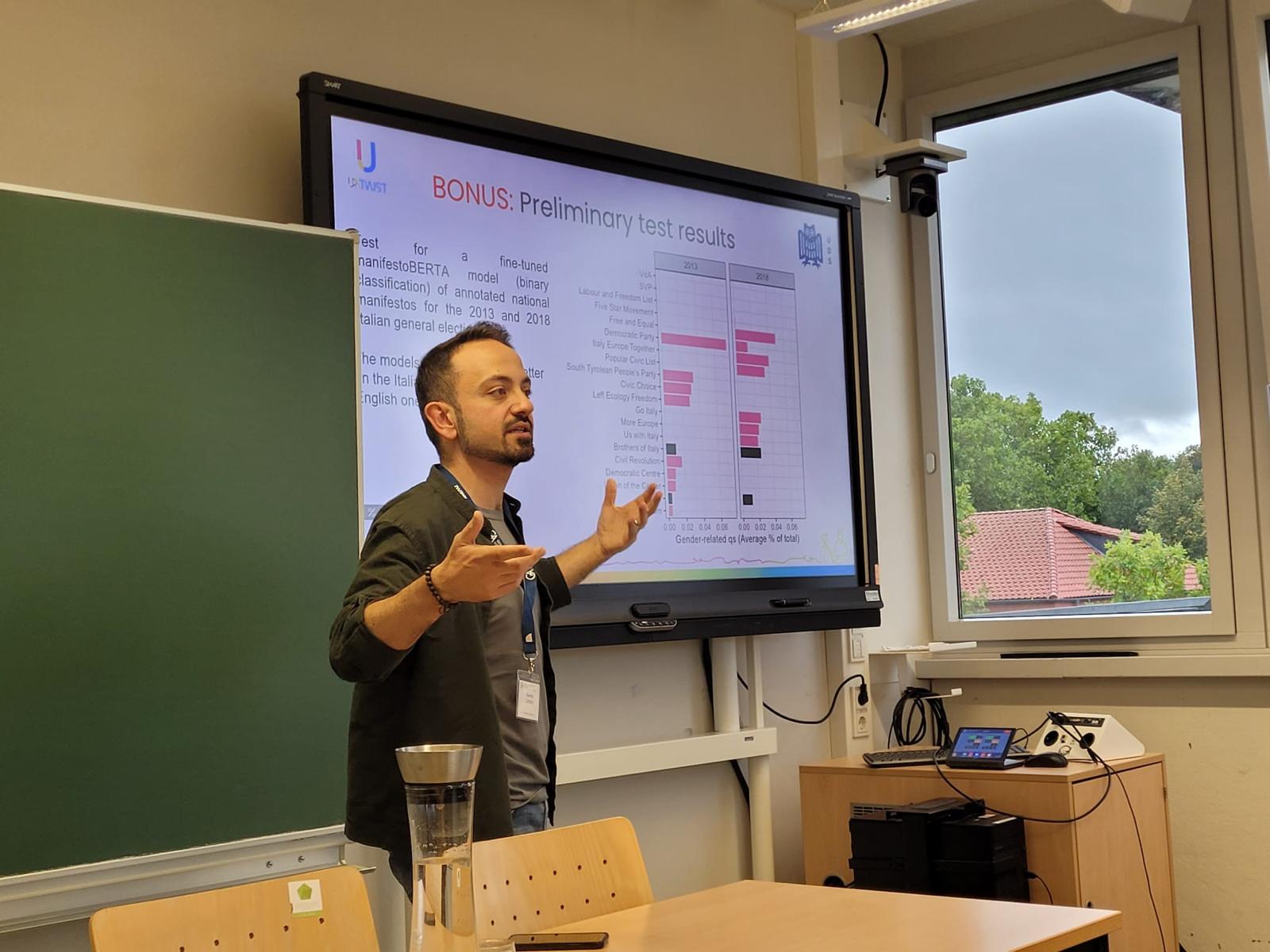UNTWIST

Title: Policy recommendations to regain feminist losers as mainstream voters (UNTWIST)
General information:
- Homepage
- Presentation video
- Start date: February 2023
- Funding: Horizon Europe - Framework Programme for Research and Innovation, 2021-2027) within the funding line "HORIZON-CL2-2021-DEMOCRACY-01 (Protecting and nurturing democracies)
- Collaborative partners: Universidad Pablo de Olavide de Sevilla (coordinator), Universidad de la Iglesia de Deusto Entidad Religiosa, Tarsadalomtudomanyi Kutatokozpont Budapest, Roskilde Universitet, Fundacio Vit - Visualizacion per a la Transparencia, Association of European Citizen Science - ECSA E.V., Saarland University
Contents: UNTWIST investigates the question of whether extreme populist parties use and fill a gap in the political spectrum that has emerged in the recent past: Do these parties actually have the potential to represent the population that has been let down by current mainstream feminist discourses? Or have mainstream parties not yet found a suitable strategy for responding to gender-related conflicts? Against the background of these questions, new political strategies are to be developed and implemented in order to counteract the anti-gender politics of parties on the extreme (and especially right-wing) fringe.
A major goal of UNTWIST is thus to enable (non-radical/populist) parties in Europe to adequately represent gender-specific interests in the population. The work package conducted at Saarland University under the direction of Prof. Dr. Daniela Braun examines the role of political parties and their thematic positioning in this context.

Co-Kreation-Workshop: Wie sollen demokratische Parteien zukünftig mit dem Thema Geschlechtergerechtigkeit umgehen?
Wie kann Geschlechtergerechtigkeit in der Politik verankert werden? Diese Frage gewinnt in politischen Debatten zunehmend an Bedeutung. Doch bei genauerem Hinsehen kreisen viele Diskussionen vor allem um das Thema Gendern, während zentrale Aspekte wie Quotenregelungen, Diversity, Chancengleichheit in Bildung und Beruf, körperliche Selbstbestimmung, geschlechtergerechte Gesetzgebung oder feministische Außenpolitik oft zu kurz kommen. Aber was erwarten die Wählerinnen und Wähler konkret von den Parteien? Genau dieser Frage widmet sich der Co-Kreation-Workshop [1], der am 27. Mai 2025 von 18:00-20:00 Uhr in der FrauenGenderBibliothek Saar stattfindet. Die Veranstaltung wird von UNTWIST, einem EU-geförderten internationalen politikwissenschaftlichen Forschungsprojekt an der Universität des Saarlandes (UdS) in Kooperation mit der FrauenGenderBibliothek Saar organisiert. Ein wesentliches Ziel von UNTWIST besteht darin, Parteien in Europa zu befähigen, geschlechtsspezifische Interessen in der Bevölkerung angemessen zu vertreten. Es geht hierbei darum viele unterschiedliche Meinungen einzubeziehen und gemeinsam Empfehlungen zu erarbeiten.
Ziel des Co-Kreation-Workshops:
Der Workshop hat zum Ziel, gemeinsam politische Empfehlungen zu erarbeiten, die etablierte politische Parteien dabei unterstützen sollen, genderbezogene Themen effektiver und gerechter in ihre Politik zu integrieren. Dabei sollen die unterschiedlichen Perspektiven der Teilnehmerinnen und Teilnehmer in die Erarbeitung konkreter politischer Strategien einfließen.
Ort und Zeitpunkt der Veranstaltung:
Wo? FrauenGenderBibliothek Saar [Großherzog-Friedrich Str. 111 66121 Saarbrücken]
Wann? Dienstag, 27.Mai 2025, 18-20 Uhr
Jetzt anmelden und mitgestalten!
Interessierte Bürgerinnen und Bürger sind herzlich eingeladen, sich aktiv am Co-Kreation-Workshop zu beteiligen und ihre Perspektive einzubringen. Es geht hierbei darum viele unterschiedliche Meinungen einzubeziehen. Als Dankeschön für die Teilnahme erhalten alle Teilnehmenden einen Gutschein, der in Saarbrücken eingelöst werden kann.[2]
Für die Teilnahme ist eine Anmeldung ist bis zum 04.05.2025 erforderlich.
Anmeldungen und Fragen bitte an: projekt-untwist(at)uni-saarland.de
Weitere Informationen zum Projekt UNTWIST sind hier zu finden: https://www.uni-saarland.de/lehrstuhl/braun/forschung-und-aktivitaeten/drittmittelprojekte/untwist.html
Ansprechpartnerin für die Presse: Prof. Dr. Daniela Braun, d.braun(at)uni-saarland
[1] Ein Co-Kreation-Workshop hat zum Ziel über die Diskussion von möglichst unterschiedlichen wissenschaftlichen wie nicht-wissenschaftlichen Perspektiven gemeinsame Vorschläge für die Politik (in unserem Fall primär für die Parteien, die die Interessen der Bevölkerung vertreten) zu erarbeiten.
[2] Da die Veranstaltung zu Forschungszwecken aufgezeichnet (Audio) wird, erhalten alle Teilnehmerinnen und Teilnehmer vorab weitere Informationen zur Datennutzung.

Video: „Untwisting Gender Representation: Evidence-Based Insights for Democratic Renewal“
On 13 February, the Horizon-funded EU project UNTWIST hosted an online event entitled ‘Untwisting Gender Representation: Evidence-Based Insights for Democratic Renewal’. The aim of the event was to analyse the link between the electoral performance of right-wing populist parties and their anti-gender positions. The video will provide you with the following event content:
- A brief overview of the key findings from the UNTWIST project.
- Reflections on the general policy implications arising from the research findings, including country-specific discussions.
- An interactive discussion with participants.

Second UNTWIST newsletter published
The UNTWIST project has published its second newsletter. The topics:
- Work Package 1: We have developed a grid concept that helps us to categorise and evaluate policy decisions.
- Outlook: What will the next Work Packages be about?
- Meet the team: The researchers from the Universidad Pablo de Olavide (UPO) introduce themselves.

First issue of the UNTWIST newsletter published
The UNTWIST project has published the first issue of its newsletter. The topics of this issue:
- Who are we? We introduce you to our 9 national teams and the 7 institutions involved in an advisory capacity, as well as our objectives related to the UNTWIST project.
- What are we currently working on? We will present the first results and findings on what and how much attention the different gender-specific needs and requirements receive from society, political parties and academia. We also analyse the way in which radical right-wing populist parties address gender-specific issues that may be overlooked by other moderate actors.
- What's new? We will introduce you to our international UNTWIST survey, with which we will conduct innovative measurements of gender-specific needs and demands from an intersectional perspective that simultaneously takes into account the voting behaviour of citizens.

UNTWIST at the DVPW Congress in Göttingen
From 24 to 27 September, the congress of the German Political Science Association on “Politics in the Polycrisis” took place at the Georg August University in Göttingen. Dr Giuseppe Carteny gave a presentation titled “From Top to Bottom: Explaining the relationship between elite polarisation and mass polarisation”.
![[Translate to Englisch:] Logo ecpr](/fileadmin/upload/lehrstuhl/braun/Tagungen/ecpr_Logo.png)
UNTWIST at the European Conference on Politics and Gender
In July 2024, the UNTWIST teams participated in the European Conference on Politics and Gender in Cologne and presented a panel with research findings related to a better understanding of gender dynamics in voting for radical right-wing populist parties. Prof Dr Daniela Braun and Dr Giuseppe Carteny presented the following paper:
The salience of gender-related issues in European party manifestos

UNTWIST auf der EPSA-Konferenz
Vom 4. bis zum 6. Juli fand die jährliche Konferenz der European Political Science Association im MediaPark Köln statt. Dr. Giuseppe Carteny stellte auf der Konferenz UNTWIST im Rahmen seines Vortrags mit dem Titel „The salience of gender-related issues in European party manifestos“ vor. Der Vortrag thematisierte das Geschlechtergefälle in der europäischen Politik und untersuchte die Rolle politischer Parteien bei der Betonung geschlechtsspezifischer Themen. Die Ergebnisse aus dem UNTWIST-Projekt zeigen, dass geschlechtsspezifische Themen an Bedeutung gewonnen haben, diese aber vom nationalen Kontext abhängen und zwischen etablierten Parteien und rechtspopulistischen Parteien unterschiedlich behandelt werden.

